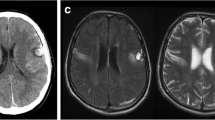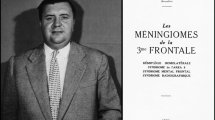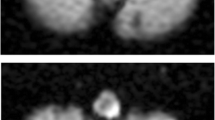Summary
A patient who developed a unilateral opercular syndrome following a cerebrovascular accident is described. Computed tomography showed that the lesion did not affect the opercular cortex, but involved deep white matter and the head of the caudate nucleus of the left hemisphere. Persistent hypophonia and transient aphasia were associated. Comparison with previous cases is discussed.
Similar content being viewed by others
References
Alajouanine TH, Thurel R (1933) La diplegie faciale cerebrale. Forme corticale de la paralysie pseudobulbaire. Rev Neurol (Paris) 40:441–458
Alajouanine TH, Boudine G, Pertuiset B, Pepin B (1959) Le syndrome unilateral de l'opercule rolandique avec atteinte controlaterale du territoire des V, VII, IX, XI et XIIe nerfs craniens. Rev Neurol (Paris) 101:168–171
Boudin G, Pepin W, Wiart JP (1960) Le syndrome operculaire unilateral d'origine vasculaire. Rev Neurol (Paris) 103:65
Bruyn GW, Gathier JC (1969) The operculum syndrome. In: Vinken PJ, Bruyn GW (eds) Handbook of clinical neurology, vol. 2. North-Holland, Amsterdam, pp 776–783
Cappa S, Guidotti M, Papagno C, Vignolo LA (1987) Speechlessness with occasional vocalizations after bilateral opercular lesions: a case study. Aphasiology 1:35–39
Damasio A, Damasio H, Rizzo M, Varney N, Gersh F (1982) Aphasia with nonhemorrhagic lesions in the basal ganglia and internal capsule. Arch Neurol 39:15–20
De Renzi E, Faglioni P (1978) Normative data and screening power of a shortened version of the Token Test. Cortex 14:41–49
Foix C, Chavany JA, Marie J (1926) Diplegie facio-linguo-masticatrice d'origine cortico-souscortical sans paralysie des membres. Rev Neurol (Paris) 33:214:219
Jurghens U, Kirzinger A, Cramon D von (1982) The effects of deep-reaching lesions in the cortical face area on phonation. A combined case report and experimental monkey study. Cortex 18:125–140
Pertuiset B, Perrier F (1960) Le syndrome operculaire unilateral (rolandique inferieur) d'origine vasculaire. Rev Neurol (Paris) 103:63–64
Rebucci GG, Gambetti P, Bottazzi G (1964) Le syndrome unilateral de l'opercule rolandique. A propos de trois observations cliniques. Acta Neurol Belg 64:1267–1278
Schott B, Boulliat G, Cotte L, Vauterin C (1961) Le syndrome operculaire bilateral et unilateral. Lyon Med 206:365–378
Spinnler H, Tognoni G (1987) Standardizzazione e taratura italiana di test neuropsicologici. Ital J Neurol Sci 6 [Suppl 8]:5–120
Thurel R (1929) Les syndromes pseudobulbaires. Thesis, Paris
Villa G, Caltagirone C (1984) Speech suppression without aphasia after bilateral perisylvian softenings (bilateral rolandic operculum damage). Ital J Neurol Sci 5:77–83
Author information
Authors and Affiliations
Rights and permissions
About this article
Cite this article
Posteraro, L., Pezzoni, F., Varalda, E. et al. A case of unilateral opercular syndrome associated with a subcortical lesion. J Neurol 238, 337–339 (1991). https://doi.org/10.1007/BF00315334
Received:
Revised:
Accepted:
Issue Date:
DOI: https://doi.org/10.1007/BF00315334




